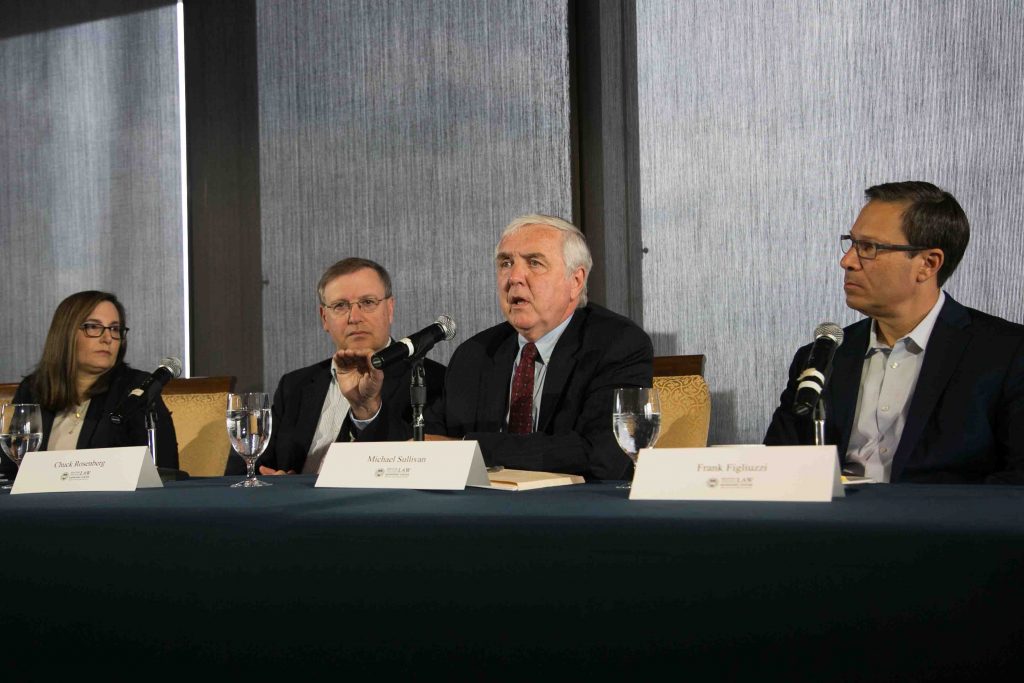With an energetic field of more than two dozen Democratic candidates vying for the party’s nomination for president for next year’s election, the 2016 election almost appears squarely in America’s rear-view mirror. But on June 25, in a packed ballroom at the Boston College Club in downtown Boston, the 2016 election and Russia’s interference in it was the primary focus of a spirited conversation sponsored by the Rappaport Center for Law and Public Policy.
The panel discussion featured Frank Figliuzzi, former assistant director for counterintelligence at the FBI and former US Attorneys Joyce Vance, Chuck Rosenberg, and Michael Sullivan and was moderated by Professor and Rappaport Faculty Director Daniel Kanstroom. Entitled “After the Mueller Report: The Attorney General, the White House, and the Congress—A Constitutional Crisis?” the conversation first centered on Mueller’s investigation and findings before turning to what legal repercussions, if any, may result from it for President Donald Trump.
“The most important point to take away from the entire Mueller Report is the point that is the most often overlooked,” began Vance. “Mueller found that there were sweeping efforts by Russia to interfere with the 2016 election.”
Meanwhile, as pointed out by Vance and later elaborated upon by Figliuzzi, the federal government has taken little to no action to secure the upcoming 2020 elections, but the American public continues to grapple with the ramifications of 2016. “The first goal of the Russian Intelligence service is to sow complete discord and chaos within the United States and to undermine us,” Figliuzzi posited, noting that that result has come to fruition as our country experiences increased levels of political polarization. “They successfully interfered with our electoral process, and we show that through over two dozen indictments by Bob Mueller of Russian operatives,” he added.
Sullivan provided a different perspective on the investigation, its scope, and its ultimate conclusions. He drew comparisons between the report and routine criminal prosecution memos written by prosecutors. When determining whether to bring charges, prosecutors evaluate whether they have enough evidence to prove those charges beyond a reasonable doubt to not only secure a conviction but also sustain that conviction upon appeal.
“What is unusual here,” Sullivan conjectured about the Mueller report, “is that there has been a pronouncement in terms of the result of a federal investigation. Most federal investigations are done privately, in confidence, in order to protect somebody who is under investigation but never been charged.” Sullivan went on to point out that the reputational damage of an open investigation can be permanent and an investigation of the president is no different, regardless of the lack of charges brought by Mueller and the Department of Justice.
Rosenberg countered that the decision to release the report came not from Mueller, as the prosecutor charged with the investigation, but rather from Attorney General William Barr, and that the fact that the president himself was part of the investigation changed the nature of the reporting. “If the president is not above the law, he at least has a different law that applies to him.”
The panel went on to explore the process of impeachment and whether the president may be charged when he no longer holds the highest office of the land.
Despite the heavy subject matter, members of the panel also regaled the audience with light-hearted stories from their times in office and drew colorful analogies for some of the decisions being made in the Oval Office today. The lesson was clear, however—foreign interference with the 2016 presidential election is as much a problem for the present day and future as it is a past incident. With the 2020 presidential election season upon us, Rosenberg closed the dynamic program with an optimistic outlook about the future of our democracy. “There is a virtue in looking forward and not back.”
Photo, from left: Joyce Vance, Chuck Rosenberg, Michael Sullivan, and Frank Figliuzzi
Lauren Koster is a 2019 graduate of Boston College Law School and a 2018 Rappaport Center for Law and Public Policy Fellow.


